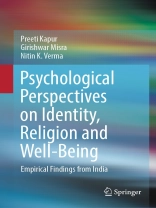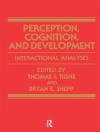This book takes a social psychological perspective to study the ways in which identity, religious beliefs and well-being are related to and affect each other in the contemporary world. It simultaneously draws upon intellectual resources from the extant interdisciplinary literature to build connections within the broader societal context. In view of the social diversity and changes in post-globalization India, issues of identity, religion and well-being emerge as dynamic and vibrant aspects of social reality in both individual and group contexts, across age groups and genders.
The current social-cultural-political scenario in the India, therefore, points to the need to investigate the outcome of personal and social well-being in relation to identity and religion. As contexts change, these issues take different shades and influence human conditions differentially. This book undertakes the investigation by going beyond the traditional tropes of behavioral science and discussing the dynamic interplay and confluence of socio-cultural-political variables in changing times. It draws from a large sample from the four major religious faiths in India—Hinduism, Islam, Christianity and Sikhism—and enables readers to understand significant interactions among facets of identity (personal and social), religious beliefs and practices and well-being (personal and social) with age and gender in an important segment of the global population.
สารบัญ
1. Introduction.- 2. Facets of Identity.- 3. Religion , Identity and Well-being.- 4. The Challenge of Understanding Religious Diversity in India.- 5. The Problem and Approach.- 6. Religion and Self-construal.- 7. Religious beliefs and practices.- 8. Religion and Well-being.- 9. Patterns of Relationships.- 10. Conclusions and Implications.
เกี่ยวกับผู้แต่ง
Preeti Kapur, Ph.D., served as an Associate Professor of Psychology at Daulat Ram College, University of Delhi, for over four decades. She has taught at undergraduate classes in social psychology, statistics, research methodology, community psychology and educational psychology. Her interest areas include cultural studies, religious studies, gender and health and well-being. She has published papers in these areas in both national and international journals. Currently, she is spending her time and energies on community out-reach programs in the areas of mental health awareness, safety and protection for youth in COVID-19 times, health and hygiene and disability.
Girishwar Misra, Ph.D., served as Professor of Psychology at the University of Delhi, for two decades. He also served as Vice Chancellor of Mahatma Gandhi Antarrashtriya Hindi Vishavavidyalaya, Wardha. Dr. Misra’s research is focused on social, developmental, health and cultural psychology. He has publishedjournal articles on these topics, many in top-tier peer- reviewed journals such as American Psychologist, International Journal of Psychology, Psychology and Developing Societies and International Journal of Behavioral Development. He has served as the President of the National Academy of Psychology (NAOP), India, and edited the journal Psychological Studies (Springer) for 16 years. He was Fulbright Senior Scholar at Swarthmore College and Michigan University, An Arbor. He is a recipient of the Jawaharlal Nehru National Award by the Government of Madhya Pradesh, National Fellowship of the Indian Council of Social Science Research, Fellowship of the NAOP, India, Fulbright Nehru Fellowship and S.C. Mitra Memorial award by Asiatic Society. His recent works include Psychosocial Interventions of Health and Well-being (Springer, 2018) and Surveys and Explorations in Psychology (Oxford, 2019).
Nitin K. Verma, Ph.D., is workingas an Assistant Professor at Bharati College of University of Delhi and as a Post Doctorate Fellow of Department of Psychology, University of Delhi, funded by Indian Council of Social Science Research (ICSSR), New Delhi. His areas of interest are social issues, religion, positive psychology, health and well-being and social change. He has published papers in both national and international journals. He has worked in multiple projects ranging from religious studies to Central for Policy Research in Higher Education National University of Education Planning and Administration, New Delhi, and notably on a UK-India collaborative project on “The psychological experience and consequences of collective participation” in Prayag Magh Mela, Allahabad.












